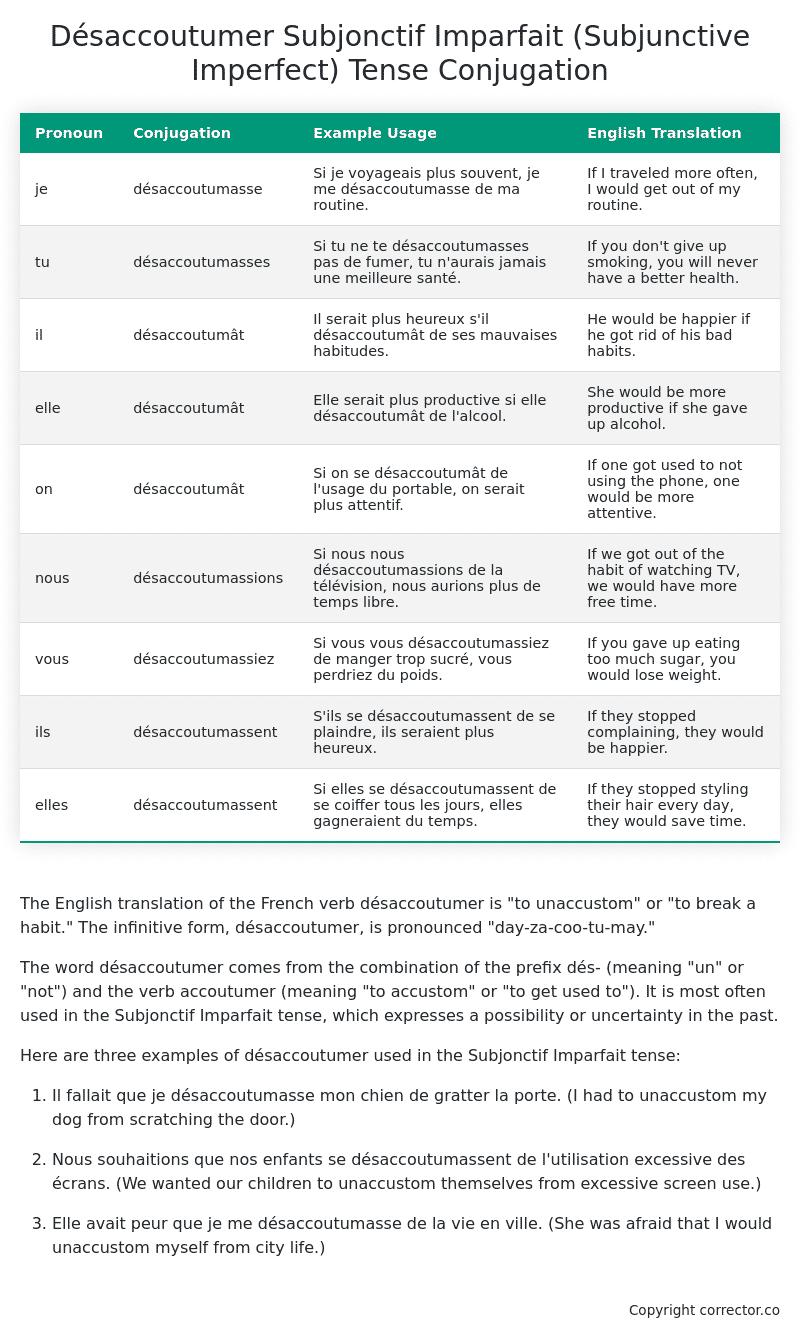Subjonctif Imparfait (Subjunctive Imperfect) Tense Conjugation of the French Verb désaccoutumer
Introduction to the verb désaccoutumer
The English translation of the French verb désaccoutumer is “to unaccustom” or “to break a habit.” The infinitive form, désaccoutumer, is pronounced “day-za-coo-tu-may.”
The word désaccoutumer comes from the combination of the prefix dés- (meaning “un” or “not”) and the verb accoutumer (meaning “to accustom” or “to get used to”). It is most often used in the Subjonctif Imparfait tense, which expresses a possibility or uncertainty in the past.
Here are three examples of désaccoutumer used in the Subjonctif Imparfait tense:
-
Il fallait que je désaccoutumasse mon chien de gratter la porte. (I had to unaccustom my dog from scratching the door.)
-
Nous souhaitions que nos enfants se désaccoutumassent de l’utilisation excessive des écrans. (We wanted our children to unaccustom themselves from excessive screen use.)
-
Elle avait peur que je me désaccoutumasse de la vie en ville. (She was afraid that I would unaccustom myself from city life.)
Table of the Subjonctif Imparfait (Subjunctive Imperfect) Tense Conjugation of désaccoutumer
| Pronoun | Conjugation | Example Usage | English Translation |
|---|---|---|---|
| je | désaccoutumasse | Si je voyageais plus souvent, je me désaccoutumasse de ma routine. | If I traveled more often, I would get out of my routine. |
| tu | désaccoutumasses | Si tu ne te désaccoutumasses pas de fumer, tu n’aurais jamais une meilleure santé. | If you don’t give up smoking, you will never have a better health. |
| il | désaccoutumât | Il serait plus heureux s’il désaccoutumât de ses mauvaises habitudes. | He would be happier if he got rid of his bad habits. |
| elle | désaccoutumât | Elle serait plus productive si elle désaccoutumât de l’alcool. | She would be more productive if she gave up alcohol. |
| on | désaccoutumât | Si on se désaccoutumât de l’usage du portable, on serait plus attentif. | If one got used to not using the phone, one would be more attentive. |
| nous | désaccoutumassions | Si nous nous désaccoutumassions de la télévision, nous aurions plus de temps libre. | If we got out of the habit of watching TV, we would have more free time. |
| vous | désaccoutumassiez | Si vous vous désaccoutumassiez de manger trop sucré, vous perdriez du poids. | If you gave up eating too much sugar, you would lose weight. |
| ils | désaccoutumassent | S’ils se désaccoutumassent de se plaindre, ils seraient plus heureux. | If they stopped complaining, they would be happier. |
| elles | désaccoutumassent | Si elles se désaccoutumassent de se coiffer tous les jours, elles gagneraient du temps. | If they stopped styling their hair every day, they would save time. |
Other Conjugations for Désaccoutumer.
Le Present (Present Tense) Conjugation of the French Verb désaccoutumer
Imparfait (Imperfect) Tense Conjugation of the French Verb désaccoutumer
Passé Simple (Simple Past) Tense Conjugation of the French Verb désaccoutumer
Passé Composé (Present Perfect) Tense Conjugation of the French Verb désaccoutumer
Futur Simple (Simple Future) Tense Conjugation of the French Verb désaccoutumer
Futur Proche (Near Future) Tense Conjugation of the French Verb désaccoutumer
Plus-que-parfait (Pluperfect) Tense Conjugation of the French Verb désaccoutumer
Passé Antérieur (Past Anterior) Tense Conjugation of the French Verb désaccoutumer
Futur Antérieur (Future Anterior) Tense Conjugation of the French Verb désaccoutumer
Subjonctif Présent (Subjunctive Present) Tense Conjugation of the French Verb désaccoutumer
Subjonctif Passé (Subjunctive Past) Tense Conjugation of the French Verb désaccoutumer
Subjonctif Imparfait (Subjunctive Imperfect) Tense Conjugation of the French Verb désaccoutumer (this article)
Conditionnel Présent (Conditional Present) Tense Conjugation of the French Verb désaccoutumer
Conditionnel Passé (Conditional Past) Tense Conjugation of the French Verb désaccoutumer
L’impératif Présent (Imperative Present) Tense Conjugation of the French Verb désaccoutumer
L’infinitif Présent (Infinitive Present) Tense Conjugation of the French Verb désaccoutumer
Struggling with French verbs or the language in general? Why not use our free French Grammar Checker – no registration required!
Get a FREE Download Study Sheet of this Conjugation 🔥
Simply right click the image below, click “save image” and get your free reference for the désaccoutumer Subjonctif Imparfait tense conjugation!

Désaccoutumer – About the French Subjonctif Imparfait (Subjunctive Imperfect) Tense
Formation
Common Everyday Usage Patterns
Interactions with Other Tenses
Subjonctif Présent
Indicatif Passé Composé
Conditional
Conditional Perfect
Summary
I hope you enjoyed this article on the verb désaccoutumer. Still in a learning mood? Check out another TOTALLY random French verb conjugation!


